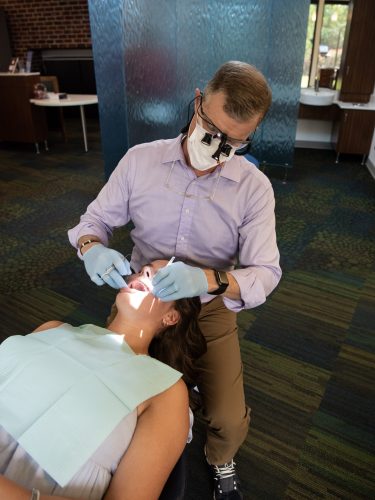

Ceramic Braces for Kids, Teens, and Adults in Madison and Greensboro, GA
Ceramic braces are much less noticeable than traditional metal braces. Schedule your FREE consultation today with Dr. Paschal!
What are Ceramic Braces?
Ceramic braces, also called clear braces or invisible braces, work similarly to traditional metal braces but with a key difference: they’re designed to match the natural color of your teeth. This is achieved by using brackets made from a ceramic material that can be either transparent or color-matched to your teeth.
Like traditional braces, ceramic braces consist of brackets bonded to the front of your teeth and connected by a thin wire. The wire applies gentle pressure to gradually shift your teeth into their correct alignment.
Ceramic braces are a popular choice for patients of any age who prefer a more discrete orthodontic appliance during treatment. In the hands of our skilled team, ceramic braces can correct a range of orthodontic issues, including overcrowding, gaps, underbites, overbites, and crossbites.
What are the differences between ceramic braces and traditional metal braces?
Ceramic braces and traditional metal braces are both effective treatments. They function in many of the same ways, using brackets and wires to gently shift your teeth. However, there are some key differences between the two:
- Material: The main difference is in the bracket materials. Traditional metal braces use stainless steel brackets, while ceramic braces use brackets made of a clear or tooth-colored ceramic material.
- Visibility: Because ceramic braces are designed to match the color of your teeth, they offer a more discrete look during treatment. Some of our patients report that their friends haven’t even noticed that the patient is in treatment!
- Durability: Metal braces are generally more durable than ceramic braces. Ceramic braces require more care as they are more delicate than their metal counterparts.
- Staining: The clear elastic ties we use with ceramic braces are prone to staining, so it’s even more important to maintain excellent oral hygiene. It also helps to limit foods and drinks that cause stains, such as coffee, wine, or certain types of berries.
- Cost: Ceramic braces typically cost more than metal braces due to the material used and the technology involved. Of course, cost isn’t the only consideration when it comes to achieving a great smile, so we work to make every treatment plan affordable. We’ll help optimize your insurance benefits (and we accept most plans)—plus, we offer affordable payment plans, including 0% interest financing.
- Treatment Time: While the treatment time for both types of braces can vary depending on each individual case, ceramic braces might take a bit longer to move teeth because we usually need to apply lighter straightening forces to keep from damaging the ceramics.
Our orthodontists are happy to discuss these factors with you and help you make an informed decision based on your personal preferences, lifestyle, and specific needs. Because both types of braces have their advantages and can help you achieve a beautiful, more confident smile, talking with your Paschal Orthodontics care team about your questions and concerns will help you find the one that will work best for you.
Choose Your New Patient Experience
6 Benefits of Ceramic Braces
Ceramic braces have several advantages that make them an appealing choice for many individuals seeking orthodontic treatment, including:
- Less Visible: Ceramic braces are less noticeable than traditional metal braces, which appeals to patients who may not like the “metal mouth” look of traditional braces. Treatment takes commitment, after all, so it’s important to consider how you’ll feel during the process.
- Same Reliability: Ceramic braces can be as effective as metal braces for many types of orthodontic issues, including overcrowding, gaps, underbites, overbites, and crossbites.
- Comfort: For many of our patients, the ceramic material used in these braces is more comfortable against the gums and inner lips than metal brackets, leading to a smoother feel during your orthodontic journey.
- Colored Bands: The clear or tooth-colored brackets can be paired with white or clear elastic bands for an “invisible braces” look. However, if you’d like to add a pop of color, colored bands can be used just like with metal braces.
- Confidence Boost: Because ceramic braces are less noticeable, they can provide a confidence boost if you may be concerned about your appearance during the treatment process.
- Versatility: Ceramic braces can be used in combination with other types of orthodontic treatments, if needed. This gives orthodontists flexibility to design a treatment plan that’s best suited for you.
Ceramic braces can be an excellent choice for people who want braces while concealing them as much as possible. The tradeoff is that it’s even more essential to maintain good oral hygiene and follow the guidance of your orthodontist for best results.


Caring for Ceramic Braces with 7 Simple Tips
Caring for ceramic braces requires a bit of attention but developing a few healthy, daily habits (while avoiding harmful habits) can ensure your braces stay in great shape and work effectively:
- Regular Brushing: Food particles can easily get stuck in your braces and lead to plaque buildup or staining. Brush your teeth at least twice daily (preferably 3 times), ideally after every meal.
- Floss Daily: Flossing might be more challenging with braces, but it’s important to remove food particles and plaque from between your teeth. Using special orthodontic floss or floss threaders can be helpful.
- Use Mouthwash: Rinsing with a fluoride mouthwash daily can help remove any bacteria and maintain overall oral health.
- Avoid Stain-Causing Foods & Drinks: Although the brackets are stain-resistant, they aren’t completely stain-proof. Plus, your elastic ties can be stained by foods and drinks such as coffee, tea, wine, and dark-colored berries. A helpful rule of thumb: if it can stain a clean white t-shirt, it will probably stain your teeth or your braces. So, if you do partake, be sure to immediately rinse or brush your teeth afterward.
- Avoid Hard or Sticky Foods: Foods like popcorn, hard candies, and chewy caramel can damage your braces and should be avoided.
- Regular Check-ups: Make sure to attend all scheduled orthodontic appointments for adjustments and to keep treatment progress moving forward.
- Emergency Care: If a bracket breaks or a wire becomes loose, don’t panic. Apply orthodontic wax to any sharp ends to protect your mouth and contact us as soon as possible to have it repaired.
Using these simple tips can keep your ceramic braces clean and functional while on your journey to a beautiful and confident smile. Developing a daily routine for caring for your braces will play a significant role in the success of your treatment!
Book a Free Consultation for Ceramic Braces in Madison and Greensboro, GA
Taking the first step toward the smile you’ve always wanted has never been easier! Paschal Orthodontics offers free consultations, and we’ll help you decide if ceramic braces are right for you. Don’t wait—book your appointment today to start your journey to the smile you’ve always dreamed of!
Ceramic Braces FAQs
How long will I have to wear ceramic braces?
Most individuals wear braces for about 18 months to 3 years. However, this varies based on several factors including the severity of your orthodontic issues, your specific treatment goals, and how well your teeth respond to braces. Your orthodontist will provide you with an estimated treatment timeline during your initial consultation, and then after you’ve been in treatment for a while, he or she will be able to give you an even better estimate about how long treatment will last.
Will ceramic braces stain?
Ceramic braces brackets themselves are resistant to staining and designed to maintain their clear or tooth-colored appearance throughout your treatment. “Resistant” is the key word here—versus “stain-proof.” In addition, the clear or white elastic ties that hold the wire to the brackets can be prone to staining. As a result, it’s important to avoid things like coffee, tea, red wine, or certain types of berries. Smoking can also lead to staining.
How often will I need adjustments?
You can expect to visit your orthodontist every 4 to 6 weeks. Regular visits to your orthodontist are an essential part of your treatment when you have braces. These check-ups allow us to monitor treatment progress and make necessary adjustments to keep things on track. Time between adjustments can vary, however, so we’ll let you know and help you plan for success.
